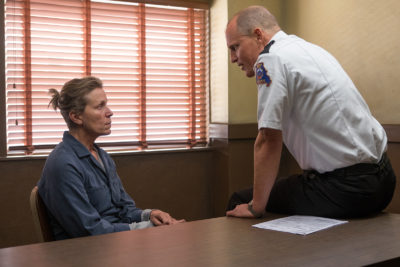
“Three Billboards Outside Ebbing, Missouri” is a heartbreakingly dark comedy that exhibits the endless complexity of the human condition.
The film is the third feature-length on the silver screen from writer and director Martin McDonagh — also known for “In Bruges” and “Seven Psychopaths.” McDonagh’s film carries its audience through so many twists and turns that he leaves no choice but to expect the unexpected.
McDonagh creates an intricate balance between humor and the brutality of the plot’s subject matter, he can make the audience laugh just moments after they were gasping in horror.
The film is cinematically beautiful, opening with shots of three rundown billboards in the early morning. Opera music swells as Mildred Hayes, played by Academy Award winner Frances McDormand, drives by the billboards. From that first shot of Mildred’s eyes in the rearview mirror, McDormand is captivating.
Mildred has been grappling with her teenage daughter’s brutal murder for the better part of the year. After seven months went by without a word from the Ebbing Police Department on a suspect, Mildred decides to take things into her own hands in a quest for justice.
She rents the space on billboards on the outskirts of town and fills them with personally pointed messages towards the police department. “Raped While Dying,” “And Still No Arrests?” and the most controversial of all, “How Come, Chief Willoughby?”
The billboards spark a frenzy in the town of Ebbing, Missouri, and Mildred stands steadfast in the face of confrontation, seamlessly adapting to each challenger at breakneck speed, firing off barbed retorts that aim for the kill.
The morality behind the billboards and Mildred’s vigilante mission becomes even more complicated when audiences learn that Chief Willoughby (a truly arresting performance by Woody Harrelson) genuinely wants to find the killer. Despite his determination to catch the culprit, the evidence just isn’t there, making this a crime story in which it’s unclear whether it will ever be solved.
The face off between McDormand and Harrelson is electric. The vulgar and unhindered dialogue that runs throughout the course of the film builds the frustrated tension between the two adversaries. They show each other both their strength as well as their vulnerability and exemplify the struggle of fighting on opposite sides of the same team.
McDonagh proves to be an extraordinary writer, populating the town with incredible characters so complex that they nearly overshadow the gripping plot. Perfectly cast, the residents of Ebbing are complicated, dimensional and emotionally riveting.
McDormand performance as Mildred is fiercely sincere — she is unrelentless with emotions that run the gamut. The nuances of her physicality and the tenor in her voice make it impossible to nail Mildred down. McDormand continually surprises by unleashing new facets of Mildred Hayes every time she appears on the screen.
Sam Rockwell is a revelation as volatile mama’s boy Jason Dixon. Dixon acts as a catalyst, escalating the situation to new heights. Through his uninhibited performance, Rockwell makes Dixon a character viewers both fear and look forward to appearing on the screen.
Nearly every performance is a standout. Lucas Hedges, best known for his work in “Manchester by the Sea,” is a calm but powerful force as Mildred’s son, Robbie. “Game of Thrones” fans will enjoy seeing Peter Dinklage capture yet another unique persona in his limited — but memorable — screen time. John Hawkes as Mildred’s abusive ex-husband Charlie, is surprisingly compassionate and sympathetic.
McDonagh’s blood-soaked exploration of humanity displays the endless struggle of grief. The constant presence of lost ones and the different ways people cope with their absence. The comedic factor makes the heavy themes of the film both more approachable and unsettling.
This film, though centered around something undeniably evil, is not a story of good and evil, but rather a story of how evil affects people. No character is easily labelled or understood, and each struggled with poignant pain, guilt, fear and anger that drives them to cross lines into somewhere darker.
























































































































